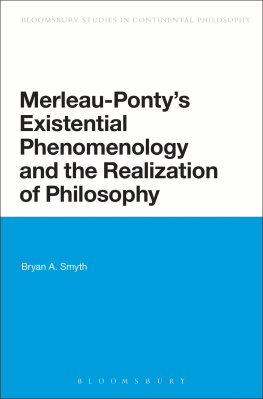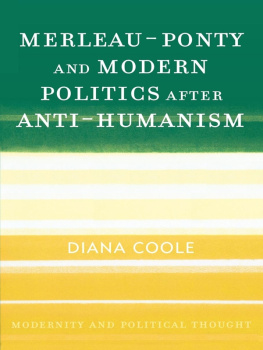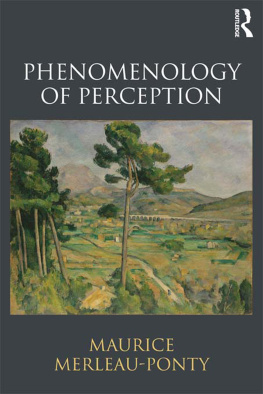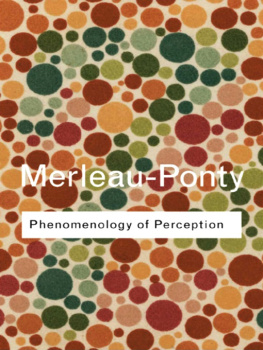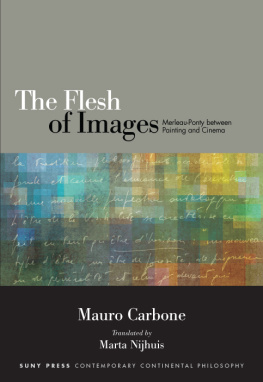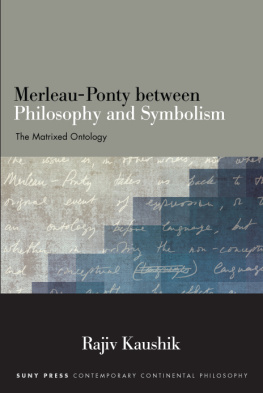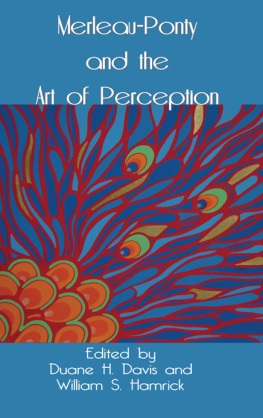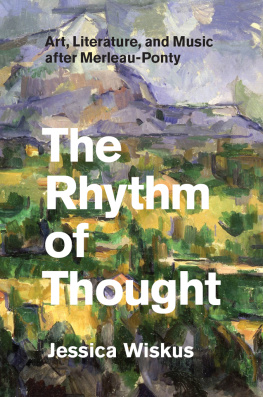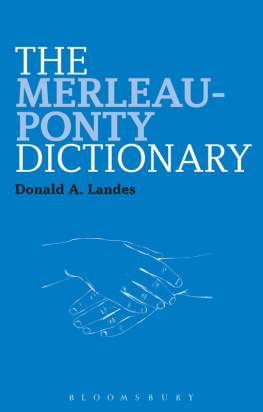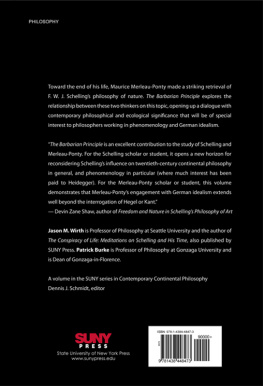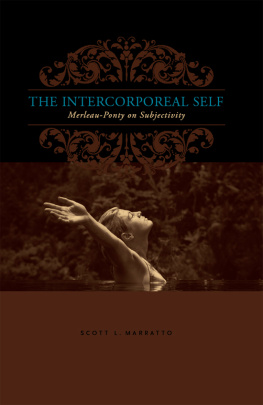Merleau-Pontys Existential Phenomenology and the Realization of Philosophy
Bloomsbury Studies in Continental Philosophy
Bloomsbury Studies in Continental Philosophy presents cutting-edge scholarship in the field of modern European thought. The wholly original arguments, perspectives and research findings in titles in this series make it an important and stimulating resource for students and academics from across the discipline.
Some other titles in the series:
Adorno, Heidegger, Philosophy and Modernity , Nicholas Joll
Between the Canon and the Messiah , Colby Dickinson
Castoriadis, Foucault, and Autonomy , Marcela Tovar-Restrepo
Deconstruction without Derrida , Martin McQuillan
Deleuze and the Diagram , Jakub Zdebik
Deleuze and the History of Mathematics , Simon B. Duffy
Derrida, Badiou and the Formal Imperative , Christopher Norris
Derrida and the Future of the Liberal Arts , edited by Mary Caputi
and Vincent J. Del Casino, Jr
Derrida: Ethics Under Erasure , Nicole Anderson
Emmanuel Levinas , Abi Doukhan
From Ricoeur to Action , edited by Todd S. Mei and David Lewin
Gadamer and Ricoeur , edited by Francis J. Mootz III and George H. Taylor
Heidegger and Nietzsche , Louis P. Blond
Immanent Transcendence , Patrice Haynes
Jean-Luc Nancy and the Question of Community , Ignaas Devisch
Kant, Deleuze and Architectonics , Edward Willatt
Levinas, Storytelling and Anti-Storytelling , Will Buckingham
Lyotard and the figural in Performance, Art and Writing , Kiff Bamford
Michel Henry , edited by Jeffrey Hanson and Michael R. Kelly
Performatives After Deconstruction , edited by Mauro Senatore
Place, Commonality and Judgment , Andrew Benjamin
Post-Rationalism , Tom Eyers
Rethinking Philosophy and Theology with Deleuze , Brent Adkins
and Paul R. Hinlicky
Revisiting Normativity with Deleuze , edited by Rosi Braidotti
and Patricia Pisters
The Movement of Nihilism , edited by Laurence Paul Hemming,
Kostas Amiridis and Bogdan Costea
The Time of Revolution , Felix Murchadha
Merleau-Pontys Existential Phenomenology and the Realization of Philosophy
Bryan A. Smyth

Contents
The ideas in this book have been brewing for many years, and as is often the case, they stem from much wider explorations. This means, among other things, that a large number of people have contributed helpfully to them in various ways over the years. For their particular forms of assistance, I would like to thank Alia Al-Saji, Renaud Barbaras, Robert Bernasconi, Ronald Bruzina, Philip Buckley, Anna Carastathis, Franoise Dastur, Duane Davis, Bernard Flynn, George di Giovanni, Wayne Froman, John Hellman, Richard Holmes, Jonathan Kim-Reuter, Don Landes, Len Lawlor, Mary Beth Mader, Iain Macdonald, Darian Meachum, Arsalan Memon, David Morris, Stephen Noble, Richard Nutbrown, and Michel Rybalka. I would also like to thank Suzanne Merleau-Ponty for kindly making available to me her volume of Merleau-Pontys unpublished personal notes from the late 1940s ( Notes indites de Merleau-Ponty, 19461949 ), and Kerry Whiteside for having transcribed these notes and for conveying copies of the originals to me.
Very special thanks to Anne Quinney for her patient support and encouragement, and to Fyntan and Aurlia for making everything so much more intensely rewarding. It is to my parents that I owe the greatest debtthe book is dedicated to their memory.
Parts of the Preface and Conclusion are reprinted from The Meontic and the Militant: On Merleau-Pontys Relation to Fink, International Journal of Philosophical Studies, 19:5 (2011), 66999, with the kind permission of Taylor & Francis Ltd.
Parts of Chapter 5 are reprinted from Heroism and History in Merleau-Pontys Existential Phenomenology, Continental Philosophy Review, 43:2 (2010), 16791, with kind permission from Springer Science + Business Media.
See bibliography for complete bibliographic information. Where applicable, page references are given in the form original/translation. Translations are, however, frequently modified.
Works by Merleau-Ponty
| AD | (1973). |
| CR | Christianisme et ressentiment, in ), pp. 933. |
| EP | loge de la philosophie (1953)/In Praise of Philosophy, in (1988), pp. 367. |
| HT | Humanisme et terreur (1947)/ Humanism and Terror (1969). |
| NI | Notes indites de Maurice |
| PhP | Phnomnologie de la perception (1945). |
| PNPH | Philosophie et non-philosophie depuis Hegel. Cours de 19601961, in (1996b), pp. 269352. |
| Pros. | Un indit de Maurice Merleau-Ponty, in (1964b), pp. 311. |
| PrP | Le primat de la perception et ses consquences philosophiques, in (1996a), pp. 41104/The Primacy of Perception and Its Philosophical Consequences, in Merleau-Ponty (1964b), pp. 1242. |
| Signes (1960)/ Signs (1964d). |
| SC | La structure du comportement (1942)/ (1963). |
| SNS | Sens et non-sens (1948)/ (1964c). |
| TT | Titres et travaux: Projet denseignement, in (2000), pp. 935. |
| VI | (1964a)/ The Visible and the Invisible (1964e). |
1988, 312ff). I would like to thank Suzanne Merleau-Ponty and Kerry Whiteside for making copies of the originals as well as the transcription available to me. Original assigned pagination is followed by transcription pagination in square brackets. At Mme. Merleau-Pontys request, it should be noted that these materials were never intended for publication.
Works by others
Carnets Saint Exupry (1975), .
| EG | Saint Exupry (1982), crits de guerre. |
| EN | (1956) Being and Nothingness. |
| ES | Roger , (2003), The Edge of Surrealism: A Roger Caillois Reader. |
| FTL | (1969), Formal and Transcendental Logic. |
| HCC | (1971), History and Class Consciousness. |
| KrV | Kant (1998), (standard A/B pagination). |
| KS | (1970), The Phenomenological Philosophy of Edmund Husserl and Contemporary Criticism. |
| KU | (2000), Critique of the Power of Judgment ( Akademie pagination). |
| MAM | Saint Exupry (1981), Le marxisme anti-marxiste. |
| MH | Roger (1938), Le mythe et lhomme. |
| PG | Saint Exupry (1942c), Pilote de guerre (Gallimard). |
| SCM | (1995), Sixth Cartesian Meditation. |
| SV | Saint Exupry (1956), Un sens la vie. |
| SZ | (1962), Being and Time. |
| TD | (2000), A Defence of History and Class Consciousness: Tailism and the Dialectic. |
| TE | Binswanger, Traum und Existenz, in ), pp. 95119. |
| TH | Saint Exupry (1939), Terre des hommes. |
| P | Binswanger, ber Psychotherapie, in Binswanger (1994), pp. 20530. |
As with other figures of like stature, there is a vast amount of secondary literature devoted to the thought of Maurice Merleau-Ponty. The last decade or so in particular has seen the publication of numerous new books. Why one more?
A critical glance at the situation in recent English-language Merleau-Ponty scholarship may be instructive here. For we see that the vast majority of recent volumes fall into one of the following two categories: (1) general introductions and reference works, It might be expounded or elucidated or spun or summarized or applied in this or that new way, but the standard working assumption is that with regard to Merleau-Pontys existential phenomenology in the immediate postwar period, there remain, so to speak, no unturned stones.
Next page
